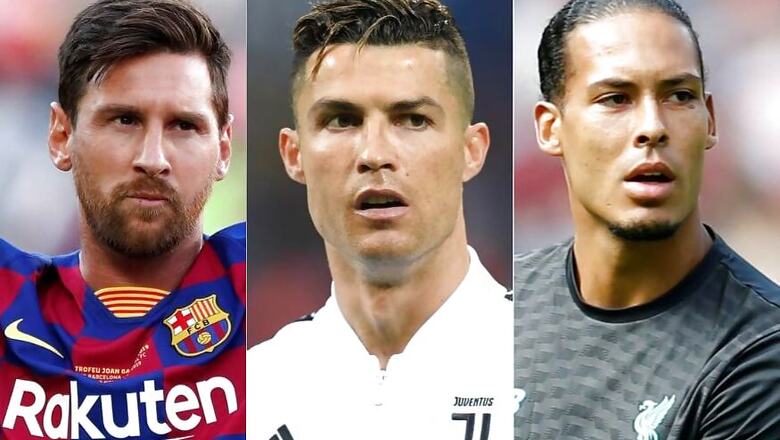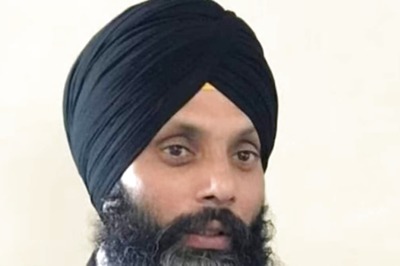
views
Tim Sparv takes his responsibility seriously. It is not, on the surface, especially onerous. All he has to do, after all, is answer a single question once a year: Who is the best football player in the world?
Still, Sparv does not make his decision lightly. He has thought about what values he wants his response to reflect. He does a little research. He makes sure he is not being lazy or unduly influenced by unconscious bias. He knows that a simple question does not always have an easy answer.
It is Sparv’s duty, though, as captain of Finland’s national team, to offer his view. Like the captain and coach of every national team, as well as an accredited journalist from each of FIFA’s 211 member federations, he has a vote in the organization’s annual Best awards. Each group — captains, coaches, journalists — accounts for 25% of the final tally; a public vote decides the other quarter. Together, they elect the men’s and women’s players and (with a little less fanfare) coaches of the year.
The prizes themselves are presented at a flashy ceremony — this year’s is in Milan on Monday — in front of the sport’s great and good, but that should not disguise the fact that they occupy an uneasy space in football’s landscape.
This is not simply because this particular incarnation is new — it is a successor to FIFA’s World Player of the Year Award and a rival, or complement, to the much longer running Ballon d’Or, handed out by the journalists of France Football magazine — but because football’s relationship with individual honors has traditionally been complex.
In England, too, the award handed out by the Football Writers’ Association predates the one conjured by the players’ union by almost three decades. All of them carried no little prestige; they were a marker of greatness, or a signpost toward it. They were not, though, central to a player’s ambitions. They were a consequence of success, not a success in themselves.
Over the past few years, though, that has changed. Players, from Paul Pogba to Neymar, now count winning either the FIFA award or the Ballon d’Or as a hotly anticipated ambition, no less a part of their planned career trajectory than winning a domestic title or claiming the Champions League.
That prioritization of the individual has, without question, been accelerated by the decadelong tussle between Lionel Messi and Cristiano Ronaldo to see who can claim the crown as FIFA’s best player most frequently. What was once an afterthought is now a crucial yardstick in their rivalry. Both have five and are finalists, alongside Liverpool’s Virgil van Dijk, for this year’s prize, too.
Last year was the first since 2007 in which neither Messi nor Ronaldo won it; it went, instead, to Luka Modric, a winner of the Champions League and the inspiration behind Croatia’s run to the World Cup final. Ronaldo was second. Few doubted that Modric deserved the award, and yet the proclamation of his victory was still, somehow, controversial, if only because Messi had finished only fifth.
This is the problem with individual prizes, whether the FIFA Best awards or the Ballon d’Or. The criteria for winning are enigmatic at best, obscure at worst. The only guidance FIFA provides voters like Sparv is Article 3 of its rules: “The awards are bestowed according to on-field performance and overall behavior on and off the pitch” over the course of the previous (European) season.
That leaves plenty of room for interpretation. Should it go to the most talented player, in which case Messi would be a shoo-in every year? Should it go to the most important to his team? Does it have to be given to someone who has lifted a major trophy?
Perhaps this is why football has long been so skeptical of these things: If a player as accomplished and high achieving as Modric could be seen as a divisive choice, then it is not entirely clear what the captains and coaches and journalists are being asked to vote for, because it is not immediately apparent what the prize means. It is much easier to dismiss it as a trinket or a bauble, the calorie of celebrity rather than the nutrition of sport.
That is not how those who vote see it. A selection of national team captains and coaches, polled by The New York Times, invariably said they put serious thought into the selections. The criteria they use, too, are remarkably similar, even if they reach their conclusions independently.
“I try to choose a player that is not the obvious choice,” said Sparv, the Finland captain. “Instead of lazily just going for Ronaldo and Messi, I have gone for Modric and van Dijk in the last two seasons. Being the world’s best player is more complex than just being the one that scores the most goals.”
Perhaps, he said, that reflects the player he is. “I value the less sexy things,” he said. “Winning the ball back, reading the game, organizing, putting pressure on the referee, covering ground. Unfortunately, the award is not nuanced enough yet: It is more an award for the best attacking player.”
He is not the only one who sees it that way. Dante Leverock, Bermuda’s captain, is a central defender: He said he voted for van Dijk as well, a nod of appreciation for the Dutchman’s mastery of his own art. “I could appreciate how good a player he is and how hard it is to have the impact he has had with Liverpool,” Leverock said.
To give its voters at least the same base of knowledge, FIFA sends each one an email containing a few basic statistics on each candidate, but Leverock did his own research, too. “The fact no opposition player managed to complete a single dribble past him in the Premier League was out of this world,” he said, adding, “He was integral to Liverpool winning the Champions League.”
That, to many, is the defining factor: Most of those interviewed said they would not vote for someone who did not win a major trophy, but all made clear that — in their eyes — what mattered was not the individual stardust, but what a player contributed to the collective.
“I choose depending on how well they do for club and country,” said Karma Shedrup Tshering, the captain of Bhutan. “When you win a trophy, it is because of the sacrifice and hard work you put in on the training field.”
Thierry Sardo, the coach of New Caledonia, said that he tries to go for “not necessarily an attacker, but a player who has been very important to his team.”
There is, at times, a perception that the award can be political. Every year, FIFA releases the votes, for transparency, and it is easy to flick through and see who has voted — or pointedly not voted — on the basis of club loyalty, friendship or rivalry.
That, to those who think through their votes and call it an honor to cast one, is beyond the pale. “The most important thing is that the vote is for what players have done, not through affinity to a player, or even worse, a team,” said Henry Hernández, the El Salvador captain.
Like all of the others, he knows that even a simple question — who is the best football player in the world? — does not necessarily have a simple answer. But the least he and his fellow members of the jury can do is vote “on merit, to make it fair,” to say which player they think it should be, not which player they would like it to be.
Rory Smith c.2019 The New York Times Company




















Comments
0 comment